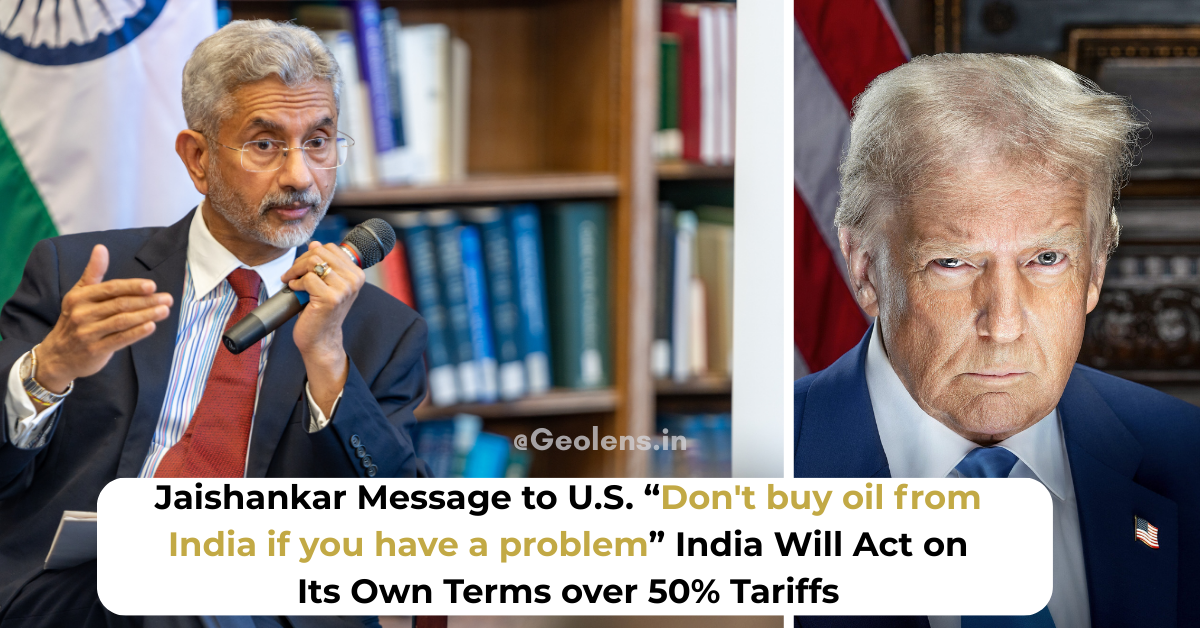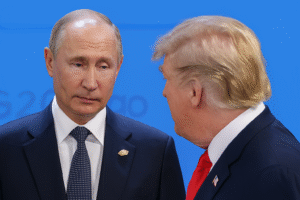Synopsis
India’s External Affairs Minister Dr. S. Jaishankar message to u.s recently made strong remarks on two key issues—India’s purchase of Russian oil and Pakistan’s role in sheltering Osama bin Laden. Defending India’s right to buy energy where it best suits national interest, and reminding the world of Pakistan’s double standards, his comments subtly but firmly carried a Jaishankar message to U.S.: India will act on its own terms, guided by sovereignty and self-interest, not by outside pressure.
Table of Contents
Introduction
In today’s rapidly changing global order, India is no longer a silent observer waiting for the approval of bigger powers. Instead, it is emerging as a confident, independent voice on the world stage. This was on full display when External Affairs Minister Dr. S. Jaishankar addressed the Economic Times World Leaders Forum.
His remarks touched on two sensitive areas: India’s continued purchase of Russian oil despite Western criticism, and Pakistan’s notorious record of sheltering Osama bin Laden. Together, these issues highlight a single underlying theme—the Jaishankar message to U.S. and the world: India will make decisions rooted in its own priorities, not dictated by outside pressure.
Jaishankar Message to U.S.: Energy Security and Russian Oil: Sovereignty First
Energy security has become one of the defining issues of the 21st century, and Jaishankar made it clear that India will not compromise when it comes to protecting its citizens’ needs.
He firmly defended India’s decision to continue buying Russian oil, calling it both a national and global necessity. During the 2022 energy crisis, when oil prices spiked dramatically, India’s decision to purchase Russian oil at discounted rates helped stabilize international markets. Critics in the West accused India of undercutting sanctions, but Jaishankar responded with characteristic sharpness:
Jaishankar Message to U.S.-
“It’s funny to have people who work for a pro-business American administration accusing other people of doing business. If you have a problem buying oil or refined products from India, don’t buy it. Nobody forces you. Europe buys, America buys—so if you don’t like it, don’t purchase it.”
POWER RESPECTS CLARITY, NOT APOLOGIES.
— खरी बात (@kharibaat3625) August 23, 2025
Jaishankar’s
‘Don’t like our oil? Don’t buy it’ is not diplomacy It’s raw statecraft.
A reminder: Nations aren’t in business of pleasing, they’re in business of surviving and winning.#IndiaUSRelations #Jaishankar #ambassdor pic.twitter.com/lqTEz3WwdC
This bold statement carried a strong undertone: India will not allow others to dictate its energy policies, especially when affordable energy is vital for farmers, small businesses, and ordinary citizens. The Jaishankar message to U.S. was crystal clear—India’s sovereignty comes first.
Trade Talks with the U.S.: Cooperation with Red Lines
India’s trade relationship with the U.S. has grown significantly in recent years, but it has not been free from friction. Negotiations often get stuck on sensitive sectors like agriculture, intellectual property, and digital trade.
Jaishankar emphasized that while India is open to greater cooperation with the U.S., it will not compromise on its red lines. Protecting vulnerable sectors such as agriculture remains a key priority. By underlining these points, Jaishankar reminded his American counterparts that India’s participation in trade agreements will always be guided by fairness, balance, and protection of domestic interests.
At the same time, he acknowledged that India’s ties with both the U.S. and China have been marked by phases of cooperation and tension. Yet, India approaches these relationships pragmatically—seeking common ground but refusing to bend under pressure.
The underlying Jaishankar message to U.S. here is that cooperation must be based on respect and equality, not on unequal expectations.
Calling Out Double Standards: The Osama Reminder
“Both U.S. and Pakistan, they have a history with each other, and they have a history of overlooking their history”
"They have a history with each other, and they have a history of overlooking their history... It is the same military that went into Abbottabad (in Pakistan) and found who there?..." says EAM Dr S Jaishankar on relations between US and Pakistan.
— WION (@WIONews) August 23, 2025
Source: ANI pic.twitter.com/3rpF4xHpte
Perhaps the most striking moment of Jaishankar’s remarks was his reference to Osama bin Laden and Pakistan’s role in sheltering him. Without naming names, he reminded the audience that the world’s most wanted terrorist was not hiding in a remote cave, but living in Abbottabad—just a short distance from a Pakistani military base.
This reminder was not accidental. It came soon after former U.S. President Donald Trump praised Pakistan, which has long been accused of supporting extremist groups. By invoking this episode, Jaishankar highlighted the hypocrisy of Western powers that continue to engage with Pakistan as a partner despite its history of enabling terrorism.
The subtext was clear: while the U.S. lectures India on whom it should buy oil from, it conveniently overlooks Pakistan’s record of harboring terrorists. This sharp contrast added weight to the Jaishankar message to U.S.—that credibility in global politics requires honesty and consistency, not selective outrage.
Critics and Counterarguments
Critics of Jaishankar’s stance argue:
- Ethical Angle: By buying Russian oil, India indirectly funds Moscow’s war machine in Ukraine.
- Strategic Risk: Overreliance on Russia for defense and oil could backfire if sanctions intensify.
- Diplomatic Image: Harsh rhetoric might alienate Western partners at a time when India needs U.S. support against China.
India’s Counter to This Argument
- National Interest First: India says its duty is to ensure affordable fuel for 1.4 billion people, not to enforce someone else’s sanctions.
- Stabilizing Markets: By buying Russian oil, India also refines and sells products globally—sometimes even to Europe—helping stabilize supply.
- Not Illegal: India is not violating international law, because only Western countries (not the UN) have sanctioned Russian oil.
So, the ethical angle is mainly a Western perspective: buying Russian oil = indirectly funding the Ukraine war.
But India views it through a pragmatic lens: energy security for citizens outweighs geopolitical morality.
Author’s Viewpoint: India’s Foreign Policy Doctrine in the Making
In my perspective, Dr. Jaishankar message to U.S. remarks signal more than a defense of India’s choices—they outline a doctrine of assertive diplomacy. India has moved from seeking approval of great powers to demanding respect as an equal, positioning itself not as a swing state but as a key pillar in the emerging multipolar world order.
1. Not Just Reaction, but Strategy
- Jaishankar wasn’t merely responding to criticism on Russian oil or Pakistan.
- Instead, his words reflected a larger pattern of Indian diplomacy: one that emphasizes sovereignty, pragmatism, and refusal to be pressured.
- This suggests India is laying down a doctrine—a consistent, guiding principle for how it engages globally.
2. From Seeking Acceptance to Demanding Respect
- For much of the Cold War and even after, India’s foreign policy often looked like it was trying to gain acceptance from big powers—whether the U.S., USSR, or even Western institutions like the IMF and World Bank.
- Today, with economic growth, military modernization, and a stronger global voice, India no longer seeks validation.
- Instead, it wants respect as an equal partner, one whose decisions are guided by self-interest, not approval from Washington, Moscow, or Beijing.
3. India’s Identity Shift: From Swing State to Pillar
- Earlier, India was often seen as a “swing state” in global affairs—meaning whichever side India leaned toward (West or Russia/China) gained an advantage.
- But now, India is not just swinging between blocs.
- It is positioning itself as a pillar in the multipolar world order—a power center in its own right.
For Example: Hosting the G20 Summit in 2023, India brought Global South concerns to the table, something neither the West nor China fully represents.
India balances U.S. partnerships (defense, tech) while maintaining ties with Russia (energy, arms) and engaging the Global South (Africa, ASEAN).
4. Resetting Expectations with the U.S.
- Dr. Jaishankar message wasn’t just anti-U.S., but it was a reset button:
- The U.S. must treat India at the same level, not a junior ally.
- Pressure tactics (on oil, trade, defense purchases) will not work.
- Cooperation must be based on mutual respect, equality, and shared interests.
So, in short: Jaishankar’s remarks represent the assertive doctrine of a rising India. They tell the U.S. and the world: India is not here to be judged or lectured; it is here to shape the order as an independent pillar of multipolarity
India’s Assertive Diplomacy: A New Foreign Policy Era
Jaishankar’s approach reflects a broader transformation in India’s foreign policy. For decades, India often tried to maintain a quiet balancing act, careful not to upset powerful partners. But today, with its growing economy, strategic importance, and global influence, India is far more assertive.
- On Energy: India is not apologetic about purchasing Russian oil because its priority is energy affordability.
- On Trade: India is willing to work with the U.S. but will not sacrifice domestic interests.
- On Security: India will continue to call out terrorism, even when uncomfortable for its partners.
This unapologetic, pragmatic stance shows a confident India willing to speak hard truths. The Jaishankar message to U.S. and to the world is that India is no longer a passive rule-taker—it is an active, equal player shaping the global order.
Why This Matters for the World
Jaishankar’s remarks are not just about India—they have wider global implications:
- Energy Stability: By refusing to abandon Russian oil, India ensures greater stability in global energy markets, indirectly benefiting even its critics.
- Global South Leadership: India is positioning itself as a voice for the developing world, showing that smaller nations don’t have to accept dictates from great powers.
- Countering Hypocrisy: By highlighting Pakistan’s role in sheltering terrorists, India is challenging the selective memory of global powers.
- Balancing Relations: India’s ability to maintain ties with both Russia and the U.S. reflects its growing role as a bridge in an increasingly polarized world.
In essence, the Jaishankar message to U.S. is also a message to the wider global community: respect the sovereignty of nations and engage in partnerships based on equality, not hierarchy.
Conclusion
Jaishankar’s remarks at the Economic Times World Leaders Forum tie into a single, consistent theme—India is charting its own path with confidence. Whether it is securing affordable energy through Russian oil, protecting red lines in trade talks with the U.S., or exposing Pakistan’s duplicity in sheltering terrorists, the message is unmistakable:
The Jaishankar message to U.S. is that India will act on its own terms, guided by national interest, not external pressure. For peace, security, and genuine cooperation to have meaning, global partnerships must be built on honesty, mutual respect, and acknowledgment of history. Only then can the world move toward a truly balanced and cooperative order.
FAQ`s
Q1: What is the main takeaway from Jaishankar message to U.S.?
The core takeaway is that India will act on its own terms—whether in buying Russian oil, negotiating trade, or addressing terrorism—guided by national interest, not external pressure.
Q2: Why did Jaishankar mention Russian oil in his message to the U.S.?
He defended India’s right to buy Russian oil, arguing that it ensures affordable energy for Indians and stabilizes global markets, while rejecting outside pressure.
Q3: How did Jaishankar link Pakistan to his message for the U.S.?
He reminded the world that Osama bin Laden was sheltered in Pakistan, highlighting the double standards of Western powers in continuing to back Pakistan despite its role in terrorism.
Q4: Does Jaishankar message to U.S. mean strained relations?
Not necessarily. The message reflects India’s confidence and autonomy. While ties with the U.S. remain important, India will protect its red lines in trade, energy, and security.
Q5: How does Jaishankar’s stance reflect India’s foreign policy today?
It shows a more assertive India—independent, pragmatic, and ready to call out hypocrisy while pursuing strong partnerships based on mutual respect.

Pratik Kondawale
Strategist | Indian Defence & Global Affairs
Founder of GeoLens.in, Pratik writes in-depth analysis on India’s defence strategy, military tech, and global power shifts delivering sharp insights through an Indian lens.


1 thought on “Jaishankar Message to U.S. “Don’t buy oil from India if you have a problem” India will Act on Its Own Terms, Over 50% Tariffs”